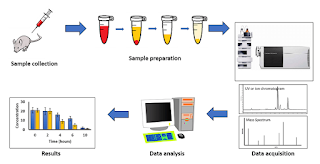10th International Conference on Mass Spectrometry and Chromatography
Liquid chromatography–mass spectrometry
Liquid chromatography:
Liquid chromatography-hyphenated technique combined with HPLC with
the detection power of mass spectrometry in which the components are
distributed between two phases.
Liquid
chromatography can be divided into five categories
Adsorption chromatography: Adsorption
chromatography enables the use of liquid chromatography to separate a racemic
mixture into its enantiomeric parts.
Partition
chromatography: The
stationary phase and the mobile phase in partition chromatography are liquid.
The stationary phase liquid would be a homogeneous mixture liquid with the
mobile phase.
Ion-exchange chromatography:
ion exchange chromatography is applied to separate and determine ions on
columns that have a low ion exchange capacity and it is based on the
equilibrium of ion exchange
Size-exclusion
chromatography:
Size exclusion chromatography separates molecules by their size. This is done
by having the stationary phase be packed with small particles of silica or
polymer to form uniform pores.
Affinity
chromatography:
Affinity chromatography involves binding reagent to analyse the molecules in a
sample.
Mass
spectrometry:
Mass Spectrometry is
analytical technique that measures mass-to-charge ratio of charged particles
ions. The basic components of a mass spectrometer are the ion source, the mass
analyser, the detector, and vacuum systems.
The mass spectrum is used to determine the mass
of their elemental and isotopic composition
Mass Spectrometry commonly utilized in
expository research facilities that consider physical, chemical, or natural
properties of assortments of compounds. Mass
spectrometry plays a vital field for analysing biomolecules such as
Glycans, Lipids, Proteins, Peptides and numerous more. This strategy is
exceedingly utilized in the field of drug delivery, for picking up data on drug
metabolism system and for pharmacokinetic considers. The application of mass
spectrometry gets to be a more effective device in forensic analysis when it is
pair with chromatography and with other analytical techniques.
Liquid chromatography–mass spectrometry
MS systems are popular used in chemical
analysis because the individual capabilities of each technique are enhanced together,
Liquid chromatography separates
the mixtures with multiple components.
Extensively applied interfaces of Liquid chromatography–mass
spectrometry is electrospray ionization, atmospheric pressure chemical
ionization and atmospheric pressure photo-ionization.


Comments
Post a Comment